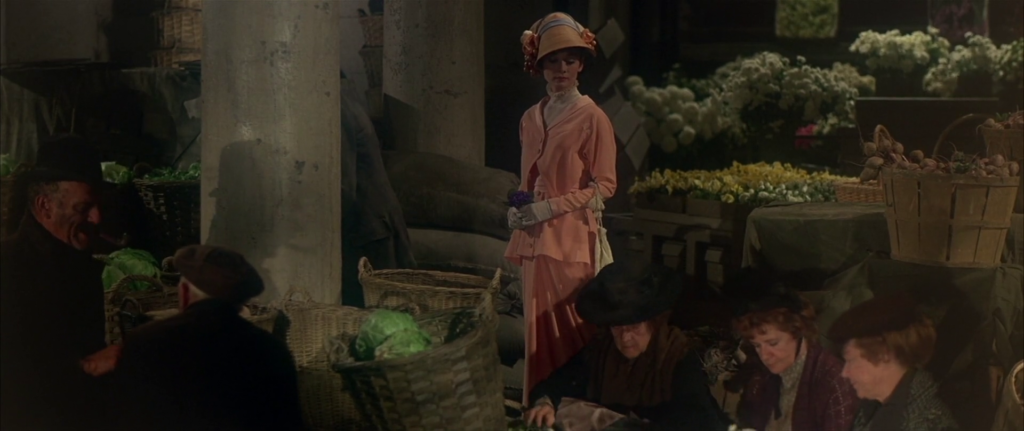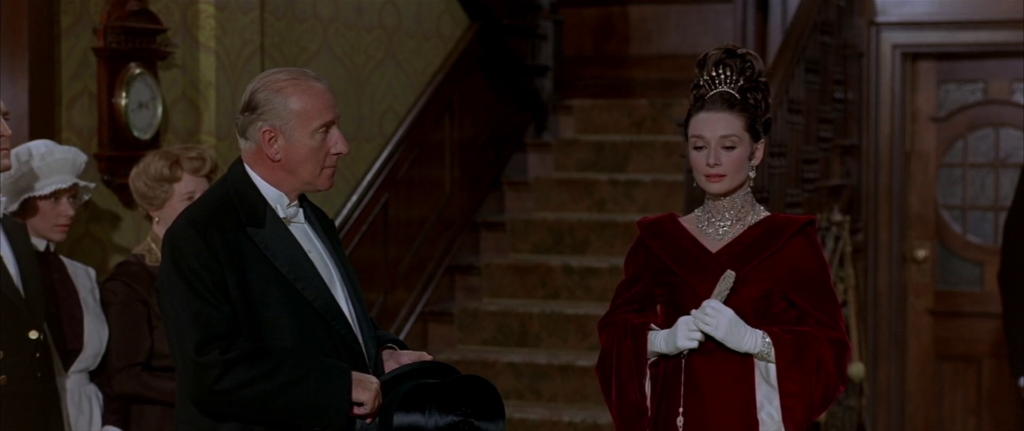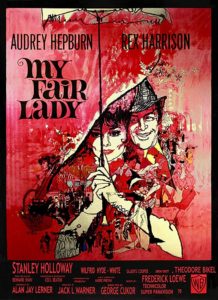|
Genres, Themes, Actors, and Directors:
- Audrey Hepburn Films
- Battle-of-the–Sexes
- Character Arc
- Class Relations
- Cross-Class Romance
- George Cukor Films
- Mentors
- Musicals
- Play Adaptations
- Rex Harrison Films
Response to Peary’s Review:
Peary notes that this “film version of Lerner and Loewe’s musical adaptation of [George Bernard] Shaw’s Pygmalian … copped eight Oscars, including Best Picture, Best Actor, and Best Director”, but he argues that “seeing it today is extremely disappointing” — and I agree. As Peary writes, “Even the best songs have become… tiresome” and “the musical numbers are the film’s major problem” due to both terrible “postproduction dubbing” and lack of “any large production numbers”. Peary further argues that director George Cukor “wrongly chose to keep scenes intact from the stage version, losing what potential the cinema has for heightening the theatrical experience”. Even more problematic are the ill-conceived lead characters: as Peary writes, “Shaw was known for creating strong, intelligent women characters, and Cukor was known for directing similar women in his films. Then why does Hepburn’s Eliza come across as such a pushover, happy to give up her freedom for life with a dull man who has treated her badly?”
Peary’s assessment is spot-on. However, while he argues in Alternate Oscars that “Harrison was the best thing about My Fair Lady,” I disagree: Harrison’s lack of any singing range whatsoever beggars belief about his casting, and while his chauvanistic characterization may (sadly) be true-to-life, he’s so unlikable he fails to elicit any sympathy. Hepburn’s transformation, meanwhile, doesn’t ring true in the slightest: she’s initially a shrewish nag, yet once her lessons with Harrison are done, she’s become someone entirely different. Yes, I know that “transformation” is the entire point of the play — but we should be seeing more hints poking through of her prior mannerisms than merely some Cockney grammar slip-ups. Worst of all, of course, is that we most certainly do NOT want Hepburn to fall for Harrison, yet we know this is what the story is leading us towards. The lesson is all wrong; this film has dated terribly, if it ever somehow managed to ring true.
Redeeming Qualities and Moments:
- Lovely cinematography

- Fine costumes and sets

Must See?
No, though most film fanatics will be curious to check it out for its historical relevance as an Oscar winner.
(Listed in 1001 Movies You Must See Before You Die)
Links:
|



2 thoughts on “My Fair Lady (1964)”
Agreed – not must-see… though I have to admit I found myself giggling throughout this *very* candid assessment. 😉
Those who gravitate toward particularly gussied-up musicals – and there are many such viewers – will of course, watch it. Many of those will rewatch it and consider it an all-time favorite. They may even think, ‘What’s not to love about ‘My Fair Lady’?!’ (It’s been dubbed “the perfect musical”.)
Well, what’s not – for maybe many of us – to love is that we just don’t fall for it in all its manipulation. (For me personally, this sort of holds true for all of the stage and screen work of Alan Jay Lerner. While I may think that – here and there – he wrote some nice lyrics for some songs, I’ve just never had a leaning toward his particular brand of romanticism: in general, I find it ‘a bit much’. But, it’s that very ‘bit much’ that draws Lerner’s followers to him.)
Though I haven’t seen this film in a long time, I’m sure I saw it at least 3 times around the time it was released or after. (No doubt, I was less critical at the time.) But I was recently sent a disc of the current – very successful – Broadway revival. I did watch it and was, more or less, bored out of my mind… with the exception of one sequence: I don’t mind the ‘Ascot Gavotte’ number, with its lilting rhythm and its critique of The Upper Class.
As most of us know, Oscars are all too often no real barometer of a film’s actual worth; they are a reflection of what (mostly conservative-thinking) Oscar voters want to win. Their choices are all-too-often suspect and/or just plain ‘off’. In 1964, ‘My Fair Lady’ was viewed as a giant valentine to cinema and Academy members responded in kind.
With apologies to The King’s English, it ain’t all that.
Like it or loathe it this is a must see as one of the last financially successful and highly regarded screen musicals. It won awards and plenty of popular and critical plaudits.
I haven’t seen it for a long time, but I remember really enjoying it even if it’s very dated in its sexual politics. Good, old fashioned craftsmanship and the leans are fun.